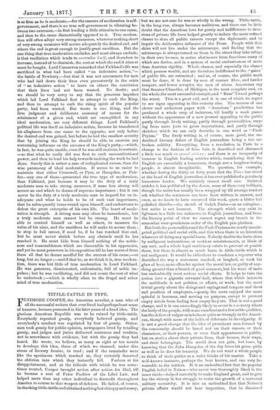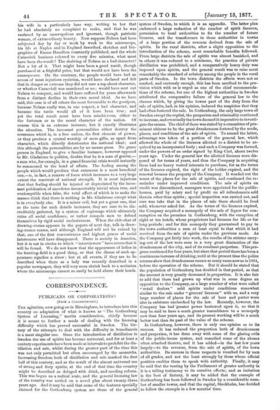1111LE-TATTLE IN TYPE.
IlENIMORE COOPER, the American novelist, a man who of all the successful writers that ever lived had perhaps least sense of humour, became possessed in his later years of a fixed idea. The glorious American Republic was to be ruined by tittle-tattle. Everybody repeated gossip, everybody believed gossip, and everybody's conduct was regulated by fear of gossip. States- men took gossip for public opinion, newspapers lived by retailing gossip, and judges and juries delivered sentences and verdicts, not in accordance with evidence, but with the gossip they had heard. He wrote, we believe, as many as eight or ten novels to develope this idea, three of which we chanced, under dire stress of literary famine, to read ; and if the remainder were like the specimens which reached us, they certainly deserved the oblivion into which they instantly fell. Furious at his disappointment, and at the ridicule with which he was some- times treated, Cooper brought action after action for libel, till he became a sort of Peter Peebles of the Libel Law, and helped more than any other individual to discredit throughout America re course to that weapon of defence. He failed, of course, in checking tittle-tattle,and obtained nothing but obloquy and worry,
but we are not sure he was so wholly in the wrong. Tittle-tattle, in the long-run, always becomes malicious, and there can be little doubt that the American love for gossip and indifference to inva- sions of private life have helped greatly to induce the more refined classes to shun all public careers except the diplomatic, and to impair the deliberative influence of the Press. People with thin skins will not live under the microscope, and finding that the microscope is always turned on them in the street they take refuge in their own houses, in entire abstinence from functions many of which are duties, and in a system of social exclusiveness of more than Austrian rigidity. Whole classes, and especially the classes which possess wealth, and are therefore indifferent to the "gains" of public life, are ostracised ; and as, of course, the public work must be done, it is done by men of coarser fibre, and harder tempers, and fewer scruples, the men of whom Americans say that Senator Chandler, of Michigan, is the most complete and, on the whole,the most successful example,and " Boss" Tweed perhaps the worst. This is a great evil, and it is one of which we regret to see signs appearing in this country also. The success of one clever and audacious paper with "American" proclivities has produced a whole crop of imitators, till hardly a week passes without the appearance of a new journal appealing to the public partly through lively writing, partly through personalities, vary- ing from mere jests to gross imputations, and partly through sketches which we can only describe in one word as " Paul- Pryism." The lively writing is, of course, mere good, the un- doubted literary defect of English journalism being a too un- broken solidity. Everything, from a revolution in Paris to a change in the fashion of false hair, is described and discussed a little too much an grand se'rit ux ; and there is an incapacity of humour in English leading articles which, considering that the English are essentially a humorous, though not a laughter-loving people, is almost inexplicable. We question, for example, whether during the thirty or forty years that the Times has stood at the head of English journalism it has ever published a genuinely humorous leader. We certainly cannot recall one. Satirical articles it has published by the dozen, some of them very brilliant, though the satire has usually been wrapped up till average readers ask whether the sentences can have been written in earnest, and even, as we know to have occurred this week, quote a bitter but polished diatribe—the sketch of Sadyk Pasha—as an eulogium ; but satire is not humour. The strength which may exist in lightness is a little too unknown to English journalism, and from the literary point of view we cannot regret any breach in the somewhat over-ponderous order of the English pen-phalanx.
But both the personalities and the Paul-Pryisms are nearly unmiti- gated political and social evils, and this when there is no intention whatever of doing any special harm. Nobody doubts the harm done by malignant insinuations, or reckless misstatements, or libels of any sort, and a whole legal machinery exists to prevent or punish them, but there is almost as much harm in tittle-tattle which is not malignant. It would be ridiculous to condemn a reporter who described the way a statesman smoked, or laughed, or took his glass of beer, as an offender against the moral law, or guilty of any- thing greater than a breach of good-manners, but his want of taste has undoubtedly most serious social effects. It helps to turn the nation into a gigantic servants'-hall, where that which interests the multitude is not politics, or affairs, or work, but the most trivial gossip about the doings and sayings and tempers and dress and position of employers,—gossip the more enjoyed the more spiteful it becomes, and serving no purpose, except to prevent empty minds from feeling how empty they are. That is not a good change, and it is one exceedingly likely to occur in a country where the body of the people, with some excellent and a few noble qualities-, has the defect of vulgar-mindedness quite as strongly as the Ameri- can, though with more of the habit of deference in its vulgarity. It is not a good change that the idea of prominent men formed by the community should be based not on their careers, or their characters, or their powers, or even their appearances in public, but on stories about their private lives, their houses, their ways, and their belongings. The world does not gain, but loses, by knowing that the John Hampden of the day loves his game quite as well as he does his tenantry. We do not want a whole people to think of their guides as a valet thinks of his master. Take a well-known instance, perhaps the best known, and one very fa- vourable to the tattlers. It is an undoubted fact that the popular English belief in Nelson—who never was thoroughly liked in the inner circle—helped materially to make England great, and to give her the victory in her struggle to resist the growth of a universal military monarchy. It is also an undoubted fact that Nelson's private affairs would not bear inspection, that he dismissed
his wife in a particularly base way, writing to her that he had absolutely no complaint to make, and that be was enslaved by an unscrupulous and ignorant, though patriotic woman, of extraordinary beauty. Now suppose Nelson had been subjected day by day or week by week to the microscope, his life at Naples and in England described, sketches and bio- graphies of Emma Hamilton constantly published, and the whole Caraccioli business referred to every five minutes, what must have been the result? The shelving of Nelson as a bad character? Not a bit of it. That might have been a good result, though purchased at a frightful price, but that would not have been the consequence. On the contrary, the people would have had an access of most injurious cynicism, would have declared and felt that in danger so extreme they did not care a rap about character, or whether Caraccioli was murdered or no ; would have sent out Nelson to conquer, and would have suffered for years afterwards from a distinct decline in their own moral ideal. As we have said, this case is of all others the most favourable to the gossipers, because Nelson really was, in one respect, a bad character, and because the tattle would all of it have been true ; and yet the total result must have been mischievous, either to the fortunes or to the moral character of the nation. Of course this is an extreme instance, but it exactly illustrates the situation. The incessant personalities either destroy the reverence which is, in a free nation, the first element of power, or they produce a cynical worship of mere gifts, as apart from character, which directly deteriorates the national ideal ; and this although the personalities are by no means gross. No grave person in England, to give a familiar instance, however opposed to Mr. Gladstone in politics, doubts that he is a man of genius,— a man who, for example, in a grand financial crisis would instantly be summoned to the head of affairs. The feeling among the people which would produce that summons is a most beneficial one,—is, in fact, a reserve of force which increases to a very large extent the reservoir of national strength. It is most injurious that that feeling should be injured or depreciated by the inces- sant publication of anecdotes inconceivably trivial when true, and contemptible when false, the total effect of which is to make the masses think that there is nothing in Mr. Gladstone except what is in everybody else. It is a minor evil, but yet a great one, that as the taste for such details increases, they are sure to be dis- creditably gathered, by a system of espionage which ultimately ruins all social confidence, or rather compels men to defend themselves by rigid social exclusiveness. When the chit-chat of drawing-rooms appears in the papers of next day, talk in draw- ing-rooms ceases, and although England will not be ruined by that, one of the first conveniences and highest graces of social intercourse will have disappeared. There is society in America, but it is not in circles to which " interviewers " have access that it will be found. We do not know that the appearance of ladies in the hunting-field is a good thing, or that the disuse of such ap- pearance signifies a straw ; but at all events, if they are to be described when there as a lady was recently described in a popular newspaper, they will very soon shrink back to a seclusion where the microscope cannot so easily be held above their heads.







































 Previous page
Previous page